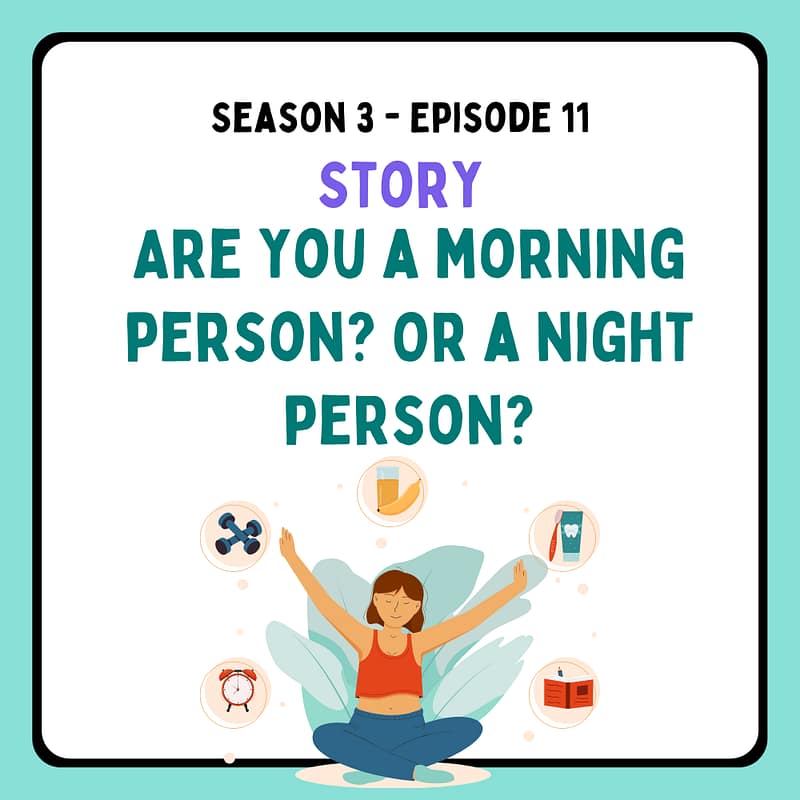Powered by RedCircle
시즌 3 11화. 당신은 아침형 인간이에요? 아니면 저녁형 인간이에요?
S3 EP11. Are you a morning person? Or a night person?
안녕하세요? 잘 지냈어요?
I’m your host, Vanessa, here at Korean Study Cafe Podcast.
Today we will listen to a story about the big trend “Miracle morning challenge” in Korea among young people.
Then now, shall we listen to the story?
Korean Script
요즘 한국의 젊은 사람들 사이에서 “미라클 모닝 챌린지”가 유행이에요. 미라클 모닝은 새벽에 일찍 일어나서 운동, 명상, 공부 등 자기계발을 하는 것이에요. 이 사람들은 보통 새벽 4-5시에 일어나요. 그리고 저녁 9-10시에 자요. 일반적으로 많은 사람들은 저녁에는 피곤하기 때문에 TV나 SNS를 봐요. 하지만 이 사람들은 이 시간을 낭비하지 않고 일찍 자요. 그리고 아침의 시간을 생산적으로 관리해요.
새벽에 일찍 일어나는 것은 처음에는 피곤하지만 습관이 되면 적응할 수 있어요. 하지만 저는 저녁형 인간이에요. 그래서 새벽에 일찍 일어나는 것이 어려워요. 그리고 주말에는 늦잠을 많이 자요.
그런데 저도 시간을 효율적으로 쓰고 싶어서 아침형 인간이 되고 싶어요. 시간을 잘 계획해서 새벽에 일어나는 것을 습관으로 만들고 싶어요. 그러니까 오늘부터 노력해 볼 거예요. 여러분은 아침형 인간이에요? 아니면 저녁형 인간이에요? 그리고 미라클 모닝에 같이 도전해보고 싶어요?
English Translation
Miracle Morning Challenge is trendy among young Koreans today. Miracle morning Challenge is to get up early and carry out self-improvement such as working out, meditation, studying, etc. These people usually get up at 4 or 5 am and go to bed at 9-10 at night.
Generally, most people scroll through social media or watch TV as they are tired at night. However, people participating in Miracle Morning Challenge don’t waste this time; instead, they go to bed early. Also, they manage morning time productively.
Getting up early in the morning is tiring at first, but you can adapt to your newer self to it once it becomes a habit. However, I’m a night person. So it’s hard to get up early at dawn. Also, I oversleep quite a bit on weekends. Nonetheless, I also want to spend my time effectively, so I want to become a morning person. I want to make a habit of getting up early at dawn by managing my time efficiently. That is why I will try my best to become a morning person starting today. Are you guys
morning person or night person? And do you want to try the “Miracle morning challenge” together?
How was it? Were you able to understand the story? Even if you didn’t, it’s fine because we will see the meaning together now.
Then, let’s check out some useful vocabulary and expressions.
요즘 한국의 젊은 사람들 사이에서 “미라클 모닝 챌린지”가 유행이에요. 미라클 모닝은 새벽에 일찍 일어나서 운동, 명상, 공부 등 자기계발을 하는 것이에요. 이 사람들은 보통 새벽 4-5시에 일어나요. 그리고 저녁 9-10시에 자요. 일반적으로 많은 사람들은 저녁에는 피곤하기 때문에 TV나 SNS를 봐요. 하지만 이 사람들은 이 시간을 낭비하지 않고 일찍 자요. 그리고 아침의 시간을 생산적으로 관리해요.
You might wonder about the popular challenge “Miracle morning” among young people in Korea. This challenge encourages people to carry out self-improvement activities such as reading a book, exercising, meditation, etc., by getting up earlier than the usual wake-up time. The key point is waking up 2-3 hours before starting school or work and spending quality personal time without any interruptions.
The essential part of a successful challenge is having a night of sufficient sleep, about 7 – 8 hours. That is why most challengers usually sleep earlier than others. This concept was introduced in 2016 by an American author named “Hal Elrod” and said we could change our lives by habits of how we spend the morning. Also, this challenge has become trendy because of a YouTuber 미국변호사 YOOJIN (US LAWYER YOOJIN KIM). She shared how her life has changed thanks to the habit of getting up early and motivated many young Koreans who want to improve their lives to achieve what they want. If you want to check out her contents, check out the description of this podcast episode. I will leave links to her youtube and Instagram.
I was personally so motivated by her and want to try this challenge as well. But now I’m pregnant, and my body condition isn’t like before. I nap often and a lot compared to the past, and sometimes I can’t accomplish what I planned for the day either. However, since I am so motivated and agree with her thoughts and methods, I will try to challenge myself after delivering a baby and recovering.
Then what do you think about this challenge? Do you also want to participate in this challenge with many Korean? Do you also want to be a morning person? Please share your opinions with me.
All right, then, now let’s see the main terminology used in this paragraph.
- 젊은 사람들 young people
- 유행이다 to be trendy
- 새벽 dawn
- 일찍 일어나다 to get up early
- 명상 meditation
- 자기계발 self-improvement
- 낭비하다 to waste
- 생산적으로 productively
- 관리하다 to manage
새벽에 일찍 일어나는 것은 처음에는 피곤하지만 습관이 되면 적응할 수 있어요. 하지만 저는 저녁형 인간이에요. 그래서 새벽에 일찍 일어나는 것이 어려워요. 그리고 주말에는 늦잠을 많이 자요.
In this part, let’s break down the word 저녁형 인간 a night person, which literally means 저녁형 night-styled 인간 human
The last word 인간 human is used a lot to create words with various meanings.
Then now, let’s see the words that used this word 인간.
인간관계 human relations or relationships, personal relationships
- 그 사람은 인간 관계가 안 좋아요. That person doesn’t have a good relationship with people
인간성 humanity, human nature, human quality
- 그는 인간성이 좋아요 He has a good human quality(personality)
- 그 살인자는 인간성에 반하는 범죄를 저질렀어요. That murderer committed a crime against humanity
인간적 humane, person’s personality
- 그 여자는 인간적이지 않아요. She doesn’t have a humane quality
인간 쓰레기 human trash, scum / It’s very informal and offensive, so be cautious when you want to use this word.
투명 인간 an invisible person
- 학교 친구들이 저를 투명 인간 취급해요. My school friends treat me like I’m invisible.
식물 인간 person in a vegetative state
- 제 친구는 교통 사고로 식물 인간이 되었어요. My friend became in a vegetative state because of a car accident
복제 인간 human clone
- 박보검은 영화 “서복”에서 복제 인간을 연기 했어요. Park Bo-geum played a role of a human clone in the movie “Seo Bok”
냉혈 인간 tin man, cold-blooded / Someone who doesn’t have empathy for others and cold-blooded
- 그 살인자는 냉혈 인간 같았어요. That murderer looked like a cold-blooded person.
How was it? As we know the meaning of 인간 human, the other compound words with this word seem easy to memorize and apply for the real situation right away, right?
All right, then now, let’s see the main vocabulary words used in this part, and then let’s see the next part
- 습관 habit
- 적응하다 to adapt, adjust, to get accustomed to
- 늦잠을 자다 to oversleep, to get up late
그런데 저도 시간을 효율적으로 쓰고 싶어서 아침형 인간이 되고 싶어요. 시간을 잘 계획해서 새벽에 일어나는 것을 습관으로 만들고 싶어요. 그러니까 오늘부터 노력해 볼 거예요. 여러분은 아침형 인간이에요? 아니면 저녁형 인간이에요? 그리고 미라클 모닝에 같이 도전해보고 싶어요?
In this part, let’s check out various expressions to describe people according to their getting up routine.
In the last two parts, we could hear the expression “저녁형 인간” which literally means night-styled person. It describes a person who feels comfortable going to bed late yet uncomfortable and uneasy getting up early. As a synonym, there’s a word 올빼미족 which literally means “owl tribe” and can be translated into English as a night owl. Also, in this case, you can use the other word 야행성, which literally means “nocturnal.” You can use this word like this.
- 나는 야행성이라서 저녁에 보통 공부를 해. As I’m nocturnal(a night person), I usually study at night.
If you want to describe such people by verbs, you can use the expressions “아침에 잘 못 일어나다” cannot get up easily in the mornings or “아침 잠이 많다” to have trouble getting up in the mornings(literally “to have a lot of morning sleep”)
For example, you can say with these
- 아침에 잘 못 일어나서 매일 엄마랑 싸워요. I can’t get up easily in the mornings, so I fight with my mom every day.
- 아침 잠이 많아서 학교에 지각을 자주 해요. I have trouble getting up in the mornings, so I’m often late for school.
Now that we know how to say a night person in Korean let’s see the acronyms too.
Can you guess what the acronyms of 저녁형 인간 would be like? Yes! Of course. It is 아침형 인간 morning-styled person, so morning person. On the contrary to 저녁형 인간, 아침형 인간 is a person who feels comfortable with waking up early yet having a hard time going to bed late. This type of person usually can focus on their work or study in the morning better than at night, right? You can also describe this type of person by a verb expression “아침 잠이 없다.” not to have any trouble getting up in the mornings(literally “not to have morning sleep”)
So you can use this expression like this
- 우리 할머니는 아침 잠이 없어서 아침에 모든 집안 일을 다 해요. My grandmother gets up early, so she does all the house chores in the morning.
All right! We learned all the sleep-pattern-related Korean words, so now you can describe your sleep pattern with one of these, right? Then what’s your type? Are you a morning person or a night owl? Please answer me in Korean!
Okay, then lastly, let’s also check out the helpful words used in this part.
- 효율적으로 effectively
- 시간을 쓰다 to spend time
- 노력하다 to try, to make an effort
- 도전하다 to challenge




